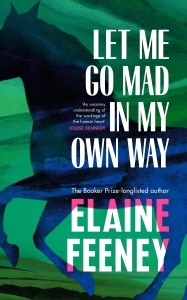Book Review: Let Me Go Mad In My Own Way by Elaine Feeney
Claire O’Connor’s life has been on hold since she broke up with Tom Morton and moved from cosmopolitan London back home to the rugged West of Ireland to care for her dying father. But snatches of her old life are sure to follow her, when Tom unexpectedly moves nearby for work. As Claire is thrown back into a love she thought she’d left behind, she questions if Tom has come for her or for himself.
Living in her childhood home brings its own challenges. While Claire tries to maintain a normal life – obsessing over the internet, going to work and minding her own business – Tom’s return stirs up haunting memories trapped within the walls of the old family house.
Let Me Go Mad in My Own Way is a story of love and resilience, rich with history and drama, and the legacies of violence and redemption. As the secrets of the past are revealed, Claire must confront whether she can escape her history to make her own future – and whether finding herself means facing herself too.
Published by Penguin Books Australia
Released May 2025
 My Thoughts:
My Thoughts:*This review contains spoilers
Every so often I read a novel that cracks me open in a wholly unique way, and these are the ones that define why I read. The way these books make me feel goes beyond a five-star rating. It’s more of an immortalisation of the text within my subconscious. I already expected to get along well with Let Me Go Mad In My Own Way, right from seeing an article about it titled: ‘This might just be the best book to come out of Ireland this year’. I was never not going to read a book with an expectation like that attached to it.
The synopsis for this one reads like it’s a story about a relationship, about coming home, and grappling with the ghosts of the past. Yes, it is about these things, but that doesn’t even begin to scratch the surface. I rarely write reviews that contain spoilers, but I just wanted the freedom to stomp about with this one instead of treading carefully. In the beginning of this novel, Claire has been home in the West of Ireland for some time, having moved back there from London after the death of her mother to care for her father who has a terminal illness. She receives a phone call from her ex-partner’s sister, telling her that Tom is moving to the West of Ireland, in fact, he will be quite close to her, because he is working on a book about Irish men and feels the need to be on the ground, so to speak. This is not welcome news for Claire and derails her. She has lost both of her parents within a short space of time and recalling the way her relationship ended with Tom, while she was in the midst of grieving her mother, is like a wound reopening. To know that Tom is moving to Ireland to write, when he never once accompanied her to visit her family, nor did he attend her mother’s funeral with her, stuns Claire and throws her contained existence into a disarray.
‘Tom Morton had always refused to visit my family in Athenry, even in the wild spring of 2019 when I fell apart entirely and eventually returned home for good as they say. And so – his imminent arrival – it felt like a trespass.’
The story indicates early on that the O’Connor family were not exactly a happy family. The first instance on this is in the retelling of the preparation of their mother’s body for burial and her funeral. The full extent of the dynamics of the household are revealed in pieces, through bitter recriminations and unending grief, things almost disclosed to each other but then left unsaid, a refusal to talk openly about certain things. There is a shadow of violence about the house, lurking and pulling at each of the O’Connor siblings, who have experienced the rage of their father in different ways, borne witness to the indignity their mother was subjected to, and each of them the product of abuse and neglect – the neglect coming from a mother who was unable to care for them as she may have wanted to on account of expending all of her energies on managing her husband’s moods.
‘As though no one would ever know my roots. I didn’t have to tell them about lambs to slaughter, or the sting of Father’s hand long after it left my cheek or thighs, or the tight grip he often had on my upper arm, teeth gnashing drumming home something, once again, that I had done wrong. I didn’t have to explain to them that I used to wet the bed for years, and how it seemed to me that French was far too fine a language to talk of such coarseness, that as a language it could not house the awful vulgarity of my childhood, and there was a freedom in this.’
Claire’s grief is more for her mother than her father. She is living in her family home alone, a place she left and only on occasion returned to in the years after. She did not come back when her mother was ill, and indeed, this weighs heavily on her as she sorts through objects and belongings, sifting through memories and moments, steeped in regret. I felt this keenly, the memories that objects can evoke. Seeing the bits of people lying about and tucked into drawers, even the most insignificant of items possessing the ability to steal your breath. Elaine Feeney writes of this with such tenderness, honouring the way that grief can manifest itself into the form of household items and random bits of flotsam that one remains desperate to hold onto.
‘Mother was about the place in raincoats, some paint cans, her wicker sewing basket still full with tiny spools of coloured thread, needles and measuring tape.’
‘I was, since returning and not leaving, trying to piece her together about the bungalow – bits of her falling out of presses and wardrobes, the drawers of pills.’
Abruptly, the story leaves the present and goes back to two different times. One of them is when Claire and her brothers were young, the other, back further, to the early 1900s, a time when all of Ireland was still one country and the Black and Tans were in force, searching for Fenians by way of pillage, torture, rape, and murder. We begin to see the traumatic legacy that lies within the family history of the O’Connor family, inherited trauma that extends way back to the Famine. Their family provides a microcosm in which Elaine Feeney can examine the history that exists in living intergenerational memory for so many Irish people. These sections from the past are not delivered lightly, in either era. The violence is front and centre, but Feeney also writes of it with such an instinctive ability to convey fear and trepidation, so it is never gratuitous, but still infinitely painful and shocking to be immersed within.
‘It was all the left-behind pain of other people in a building that suffocates me.’
‘Some didn’t take the free round at the bar, others walked out, indignant, and stood about, one man spat viciously outside the pub and another smashed a glass against the arch in honour of his grandfather who was hung upside down by the Black and Tans and his throat slit so he died a long and slow death.’
‘The were owed, they were owed, oh, but they were owed.’
The story in the present day sees Claire reconnecting with Tom and the two of them moving on from their past into a newer kind of territory for both of them. When Claire’s brothers begin to witness this reconnection and note a change in Claire’s character, the younger regards it as positive, the older one is terrified. The only sibling to fully know what caused his mother’s death, the burden of being the eldest son of a violent man and fully informed on his family history has Connor in the grips of a breakdown and he is barely holding it together. He mistakenly believes his sister is treading in their mother’s footsteps within her relationship with Tom, and he cannot accept that she should be at the mercy of a violent man, moreover, an Englishman as well. His fear morphs into a rage against Tom that has a profound effect on the entire family. The full extent of what happened to the O’Connor family at the hands of the Black and Tans one fateful evening is revealed, but the extent that this still weighs upon the current generation was splintering in its intensity. Alongside this, Claire is at last made aware of how her mother died. She starved herself to death, refused to eat for months and months, to avoid having to nurse her husband through his final days, dying before him and leaving him alone, and for one single moment in time, taking control of her own fate.
‘Claire was a good daughter, reading her father, trying to predict his moods, his laughter, if he had drink taken, read his silence, reading the road ahead of him – the day, the weather. She had become much like her mother for trying to make everything fall into place for the family.’
This story is intense, often brutal and stunning, but it was also magnificent. To witness this family break apart and then begin to heal was astonishingly life affirming. Elaine Feeney is a force, the way she writes and the way she lets a story fall open at the most unexpected moments. I know I’ve got a real thing for Irish fiction and rarely do anything other than rave about each Irish novel I read, but this one is truly in a class of its own. I can’t remember which publication it was that I read that initial article in, but I agree entirely that Let Me Go Mad In My Own Way is indeed ‘the best book to come out of Ireland this year’. Perhaps ever.
‘Of course you can love, you’re full of daft love, Claire O’Connor – and that’s both to your credit and your madness.’



